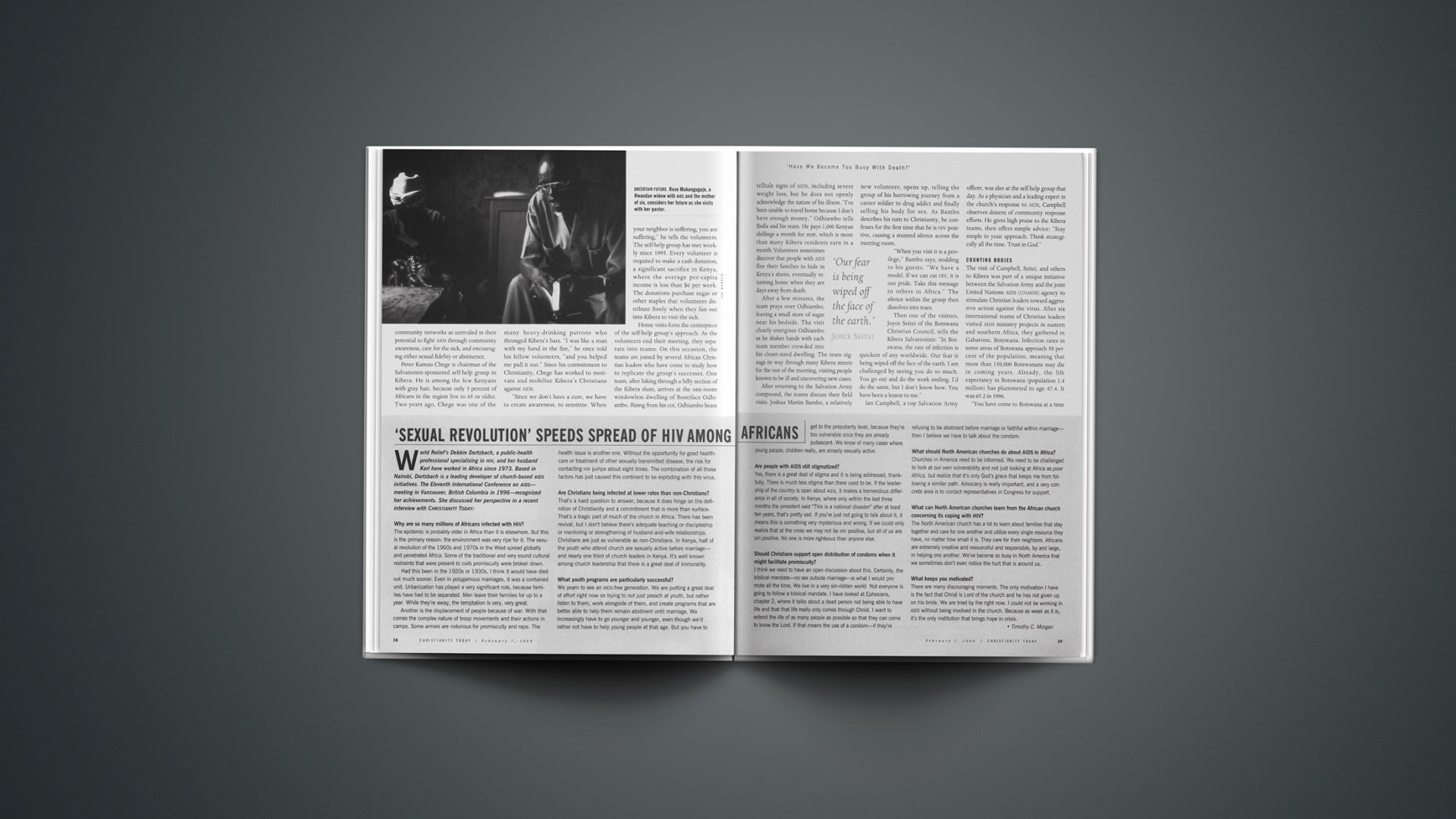World Relief’s Debbie Dortzbach, a public-health professional specializing in HIV, and her husband Karl have worked in Africa since 1973. Based in Nairobi, Dortzbach is a leading developer of church-based AIDS initiatives. The Eleventh International Conference on AIDS—meeting in Vancouver, British Columbia in 1996—recognized her achievements. She discussed her perspective in a recent interview with Christianity Today:
Why are so many millions of Africans infected with HIV?
The epidemic is probably older in Africa than it is elsewhere. But this is the primary reason: the environment was very ripe for it. The sexual revolution of the 1960s and 1970s in the West spread globally and penetrated Africa. Some of the traditional and very sound cultural restraints that were present to curb promiscuity were broken down. Had this been in the 1920s or 1930s, I think it would have died out much sooner. Even in polygamous marriages, it was a contained unit. Urbanization has played a very significant role, because families have had to be separated. Men leave their families for up to a year. While they’re away, the temptation is very, very great. Another is the displacement of people because of war. With that comes the complex nature of troop movements and their actions in camps. Some armies are notorious for promiscuity and rape. The health issue is another one. Without the opportunity for good healthcare or treatment of other sexually transmitted disease, the risk for contacting HIV jumps about eight times. The combination of all those factors has just caused this continent to be exploding with this virus.
Are Christians being infected at lower rates than non-Christians?
That’s a hard question to answer, because it does hinge on the definition of Christianity and a commitment that is more than surface. That’s a tragic part of much of the church in Africa. There has been revival, but I don’t believe there’s adequate teaching or discipleship or mentoring or strengthening of husband-and-wife relationships. Christians are just as vulnerable as non-Christians. In Kenya, half of the youth who attend church are sexually active before marriage—and nearly one third of church leaders in Kenya. It’s well known among church leadership that there is a great deal of immorality.
What youth programs are particularly successful?
We yearn to see an AIDS-free generation. We are putting a great deal of effort right now on trying to not just preach at youth, but rather listen to them, work alongside of them, and create programs that are better able to help them remain abstinent until marriage. We increasingly have to go younger and younger, even though we’d rather not have to help young people at that age. But you have to get to the prepuberty level, because they’re too vulnerable once they are already pubescent. We know of many cases where young people, children really, are already sexually active.
Are people with AIDS still stigmatized?
Yes, there is a great deal of stigma and it is being addressed, thankfully. There is much less stigma than there used to be. If the leadership of the country is open about AIDS, it makes a tremendous difference in all of society. In Kenya, where only within the last three months the president said “This is a national disaster” after at least ten years, that’s pretty sad. If you’re just not going to talk about it, it means this is something very mysterious and wrong. If we could only realize that at the cross we may not be HIV positive, but all of us are sin positive. No one is more righteous than anyone else.
Should Christians support open distribution of condoms when it might facilitate promiscuity?
I think we need to have an open discussion about this. Certainly, the biblical mandate—no sex outside marriage—is what I would promote all the time. We live in a very sin-ridden world. Not everyone is going to follow a biblical mandate. I have looked at Ephesians, chapter 2, where it talks about a dead person not being able to have life and that that life really only comes through Christ. I want to extend the life of as many people as possible so that they can come to know the Lord. If that means the use of a condom—if they’re refusing to be abstinent before marriage or faithful within marriage—then I believe we have to talk about the condom.
What should North American churches do about AIDS in Africa?
Churches in America need to be informed. We need to be challenged to look at our own vulnerability and not just looking at Africa as poor Africa, but realize that it’s only God’s grace that keeps me from following a similar path. Advocacy is really important, and a very concrete area is to contact representatives in Congress for support.
What can North American churches learn from the African church concerning its coping with HIV?
The North American church has a lot to learn about families that stay together and care for one another and utilize every single resource they have, no matter how small it is. They care for their neighbors. Africans are extremely creative and resourceful and responsible, by and large, in helping one another. We’ve become so busy in North America that we sometimes don’t even notice the hurt that is around us.
What keeps you motivated?
There are many discouraging moments. The only motivation I have is the fact that Christ is Lord of the church and he has not given up on his bride. We are tried by fire right now. I could not be working in AIDS without being involved in the church. Because as weak as it is, it’s the only institution that brings hope in crisis.
Related Elsewhere
See today’s related story, ‘Have We Become Too Busy With Death?’See more on Debbie Dortzbach at the Wheaton College Archives and ReligionToday.
Copyright © 2000 Christianity Today. Click for reprint information.










